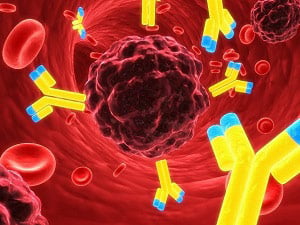Rats have long been one of humanity's worst enemies.
Flea-infested rats were carriers of the bubonic plague that killed between 75 million and 200 million Europeans in the mid-14th century.
Today, rats still carry and spread many diseases - some fatal - including Hantavirus Pulmonary Syndrome, murine typhus, and rat-bite fever.
But I love rats - specifically, OmniRats.
 These rodents - developed by biotech researchers - contain disease-fighting antibodies that are remarkably similar to the ones found in us humans. And those researchers believe they'll be the key to dozens of successful drugs.
These rodents - developed by biotech researchers - contain disease-fighting antibodies that are remarkably similar to the ones found in us humans. And those researchers believe they'll be the key to dozens of successful drugs.
This is the type of biotech breakthrough that defines "How We Thrive" in the Singularity Era.
To the healthcare community, that means these rats have the potential to save millions of lives.
To the company behind these rats, they mean new clients, more revenue, and bigger profits.
To tech investors like you, that could mean 50% gains in the next 12 months alone.
And a lot more after that...
The "Perfect" Rat
Rats are playing a big role in fighting cancer and other diseases for one simple reason: These rodents are surprisingly genetically similar to humans.
A groundbreaking 2004 report sponsored by the National Institutes of Health (NIH) found that almost all human genes known to be associated with diseases have counterparts in the rat genome. NIH researchers don't usually weigh in on the future impact of their research. This study was an exception.
Don't Miss: Get the Best Investing Research Today to Grow Your Money
Talking about the payoff from this study, Dr. Elias Zerhouni, who served as director of the NIH during the George W. Bush administration, said that "this is an investment that is destined to yield major payoffs in the fight against human disease."
Simply put, the NIH's finding confirms that the rat is an excellent model for many areas of medical research. And one field in particular is already having a huge impact on treatments while offering investors the potential for outsize gains - human antibodies.
 Antibodies are proteins that can identify and remove foreign elements from the bloodstream. Our bodies produce them every day, just not in the amounts needed to keep us completely disease-free.
Antibodies are proteins that can identify and remove foreign elements from the bloodstream. Our bodies produce them every day, just not in the amounts needed to keep us completely disease-free.
Researchers have long known that antibody-based drugs would be powerful weapons in medicine. But until fairly recently, actually creating such drugs was a real challenge.
In 2008, scientists at privately held Open Monoclonal Technology Inc. (OMT) made a major breakthrough. They started breeding rats that could produce the antibodies needed to fight off all kinds of diseases. By 2011, they had bred the "perfect" rat, one that could consistently produce antibodies that were identical in every important way to those found in humans.
OMT's discovery quickly got the attention of Big Pharma. Roughly 30 major drug firms and academic research labs signed up for a steady supply of the OMT's lab-made antibodies, making it a darling of the biopharmaceutical world.
Thanks to several breakthroughs along the way, antibody-based drugs are now one of the hottest areas of new medical research. A study by Evaluate Pharma forecast that by 2020, half of the world's 20 top-selling drugs will be based on antibodies.
Already, 65 different antibody-based drugs have come to the market. An estimated 500 more antibodies are in various clinical trial stages.
Right now, this is a roughly $80 billion market, but analysts say it could nearly double to $150 billion as soon as 2020. No wonder so many of the world's top drug and biotech firms are working with OMT.
In addition to the OmniRat, this firm has also bred the ideal mouse, known as OmniMouse. Mice have a unique set of genetic traits, distinct from rats, and this opens up the door to a whole new set of antibody candidates.
Unfortunately for retail investors, they could not invest in OMT and its antibodies because it was a privately held company.
But that's recently changed....
[mmpazkzone name="in-story" network="9794" site="307044" id="137008" type="4"]
You Can Now Own These Rats
 That's because Ligand Pharmaceuticals Inc. (Nasdaq: LGND) bought OMT in December 2015 for $178 million.
That's because Ligand Pharmaceuticals Inc. (Nasdaq: LGND) bought OMT in December 2015 for $178 million.
Ligand is a biopharma company that owns a broad range of properties and technologies that it then licenses to drug firms for hefty royalties. It's using that same model with OMT's antibody rodent-based platforms, known collectively as OmniAb.
By the time the Ligand buyout was announced, OmniAb already had 16 such licensing deals in place with which it was garnering hefty royalty streams.
Profit Opportunity: How to Grab Explosive Emerging-Market Profits and Keep Your Money Here at Home
Another 83 of OmniAb's partners are in the development stage with their antibody-based drugs and, therefore, have the potential to become royalty generators for Ligand as well. Indeed, since its purchase of OMT, Ligand has announced deals with Gilead Sciences Inc. (Nasdaq: GILD) and Emergent BioSolutions Inc. (NYSE: EBS).
OmniAb's base of patents are protected until 2033. But yearly improvements in the base research are likely to extend the moat around this firm's intellectual property until 2040.
That's plenty long enough for our purposes.
Ligand Pharma, based in the San Diego area, has an impressive business model. It buys early-stage drug firms like OMT that have developed compelling new disease treatments. Its executives and sales staff then uses their deal-making skills to convince major drug firms to use these biotechnologies to create or expand entire classes of drugs.
When those drugs hit the market, Ligand sits back and collects juicy royalty checks. Right now, Ligand has 65 licensing partners that are spending $1 billion-plus every year to pursue more than 100 distinct drug programs.
Thanks to this novel approach, Ligand earns $0.90 per dollar of revenue it rakes in. And with more than $100 million in cash in hand, and royalty checks arriving in the mail every day, Ligand is poised to repeat this winning business formula time and again...
The Opening We've Been Looking For
This is an opportune time to be focusing on stocks like Ligand.
The recent biotech sell-off pushed this stock 33% off from its 52-week high. That's not the result of bad news from Ligand. Instead, it's due to the run-for-cover mood that investors have been in since the presidential election heated up.
Ligand opened today at $106.40 and is valued at $2.24 billion. This firm's savvy licensing-based business model has led to a 31% yearly spike in sales since 2012.
I'm projecting a price of $160 by this time next year - a 50% leap from where we are now.
One in three Americans has saved $0 for retirement. And the median savings of families close to retirement - ages 56 to 61 - is $17,000.
So with a stock like Ligand, you could turn that $17,000 into $25,500 in just 12 months.
That makes this not just a great example of how biotech will fundamentally change "How We Thrive" in the Singularity Era.
Ligand's purchase of OMT and its rodent-based antibody platform will help you thrive - and aim your family toward wealth and security for years to come - because it's a great long-term investment.
Special Report: Cannabis Is the Gold Rush of the 21st Century - 30 Stocks to Invest in Now. Read more...
Follow Money Morning on Facebook and Twitter.
About the Author
Michael A. Robinson is a 36-year Silicon Valley veteran and one of the top tech and biotech financial analysts working today. That's because, as a consultant, senior adviser, and board member for Silicon Valley venture capital firms, Michael enjoys privileged access to pioneering CEOs, scientists, and high-profile players. And he brings this entire world of Silicon Valley "insiders" right to you...
- He was one of five people involved in early meetings for the $160 billion "cloud" computing phenomenon.
- He was there as Lee Iacocca and Roger Smith, the CEOs of Chrysler and GM, led the robotics revolution that saved the U.S. automotive industry.
- As cyber-security was becoming a focus of national security, Michael was with Dave DeWalt, the CEO of McAfee, right before Intel acquired his company for $7.8 billion.
This all means the entire world is constantly seeking Michael's insight.
In addition to being a regular guest and panelist on CNBC and Fox Business, he is also a Pulitzer Prize-nominated writer and reporter. His first book Overdrawn: The Bailout of American Savings warned people about the coming financial collapse - years before the word "bailout" became a household word.
Silicon Valley defense publications vie for his analysis. He's worked for Defense Media Network and Signal Magazine, as well as The New York Times, American Enterprise, and The Wall Street Journal.
And even with decades of experience, Michael believes there has never been a moment in time quite like this.
Right now, medical breakthroughs that once took years to develop are moving at a record speed. And that means we are going to see highly lucrative biotech investment opportunities come in fast and furious.
To help you navigate the historic opportunity in biotech, Michael launched the Bio-Tech Profit Alliance.
His other publications include: Strategic Tech Investor, The Nova-X Report, Bio-Technology Profit Alliance and Nexus-9 Network.



